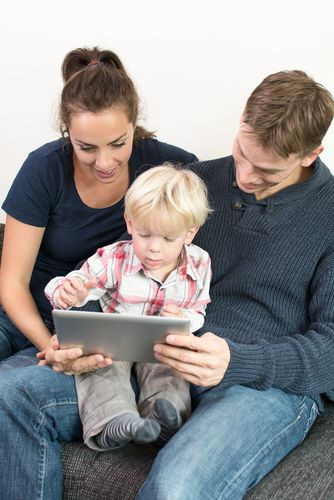Toddlers And Technology: American Academy of Pediatrics Weighs Pros And Cons Of Its Use To Determine Guidelines

Technologically savvy parents around the world gush at their toddlers’ ability to navigate their smartphones and tablets. Many of us actively encourage our little kids to exercise their little fingers on the latest technology by downloading supposed intelligence-boosting, kid-friendly apps. But how much is too much? This question remains unanswered, even by experts of the American Academy of Pediatrics (AAP), who now plan to develop new policies regarding electronic media use among children.
The last time the AAP wrote a policy statement about electronic media use was in 1999. At the time, it aimed to educate parents about the effects TV programs, videos, and DVD viewing may have on children below 2 years old. There have been huge advancements in technology since then. The remote control has become almost obsolete, and the invention of the smartphone touch screen now gives us everything at our fingertips — literally.
Toddlers have also been quick to adapt to these innovations. According to Common Sense Media, 38 percent of kids under 2 now use smartphones or iPads. By 2015, those numbers are expected to rise even more.
But these technologies are not all bad. Many experts believe that when used appropriately, they are a great tool for imparting education and creativity. There are several apps that teach word-building, math skills, and language skills.
To explore the pros and cons of touchscreen technology use among children, two pediatricians will be holding a point-counterpoint session titled "Are Tablets APP-propos for Toddlers?” at the AAP National Conference & Exhibition on Monday. Taking the "pros" side will be Dr. Dimitri Christakis, while Dr. Donald Shifrin will take the "cons" side. By participating in the debate, the two doctors hope to arrive at a consensus about technology use among kids, which parents will be able to enforce.
The subject is complex, because touchscreen are really just a delivery tool. Whether a toddler watches a movie through a DVD player or a smartphone, they're still watching a movie. But when the touchscreen is used to read books to children, or play educational games, it's a whole different ballgame. Instead of totally dismissing these technologies, Christakis said their use and subsequent effects should be investigated. "We don't want to risk appearing so out of touch that we're irrelevant and people won't take our advice seriously," he said in a press release.
Dr. Shifrin, on the other hand, worries that without policies curbing the use of mobile apps, parents who believe they're educational may adopt a "more-is-better" mentality. "The most dangerous thing we can do for youngsters nowadays is to deny them access to the digital world," Shifrin said in a release. "But the second most dangerous thing is to give them unlimited access."
Source: Shifrin D, Christakis D. Are Tablets APP-propos for Toddlers? At The AAP National Conference & Exhibition. 2014.



























